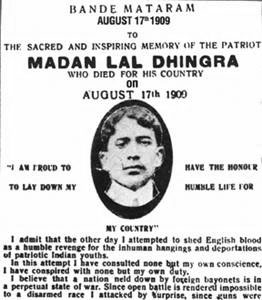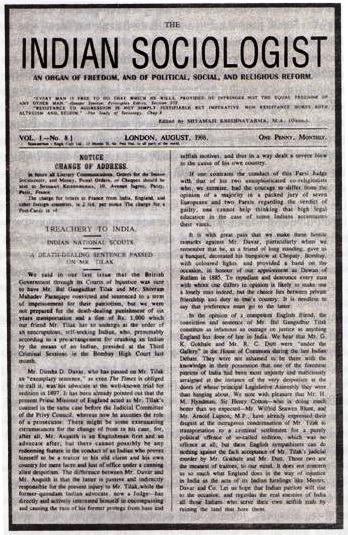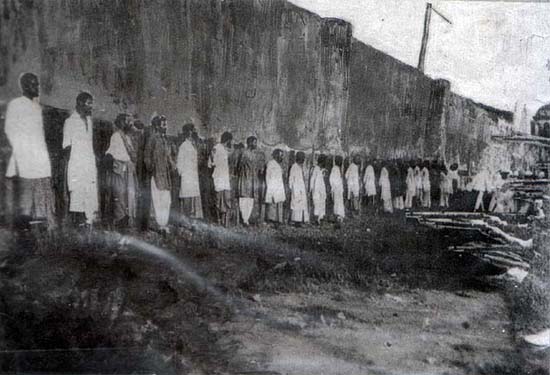|
Bande Mataram (Paris Publication)
The ''Bande Mataram'' was an Indian nationalist publication from Paris begun in September 1909 by the Paris Indian Society. Founded by Madam Bhikaji Cama, the paper along with the later publication of ''Talvar'' was aimed at inciting nationalist unrest in India and sought to sway the loyalty of the Sepoy of the British Indian Army. It was founded in response to the British ban on Bankim Chatterjee's nationalist poem of Vande mataram, and continued the message of the journal ''Bande Mataram'' edited by Sri Aurobindo and published from Calcutta, and ''The Indian Sociologist'' that had earlier been published from London by Shyamji Krishna Varma Shyamji Krishna Varma (4 October 1857 – 30 March 1930) was an Indian revolutionary fighter, an Indian patriot, lawyer and journalist who founded the Indian Home Rule Society, India House and ''The Indian Sociologist'' in London. A graduate of .... References * ''Indian Unrest'', by Valentine Chirol. 2000. . pp149–151 * . p49 * ... [...More Info...] [...Related Items...] OR: [Wikipedia] [Google] [Baidu] |
Paris Bande Mataram 17 August 1909
Paris () is the capital and most populous city of France, with an estimated population of 2,165,423 residents in 2019 in an area of more than 105 km² (41 sq mi), making it the 30th most densely populated city in the world in 2020. Since the 17th century, Paris has been one of the world's major centres of finance, diplomacy, commerce, fashion, gastronomy, and science. For its leading role in the arts and sciences, as well as its very early system of street lighting, in the 19th century it became known as "the City of Light". Like London, prior to the Second World War, it was also sometimes called the capital of the world. The City of Paris is the centre of the Île-de-France region, or Paris Region, with an estimated population of 12,262,544 in 2019, or about 19% of the population of France, making the region France's primate city. The Paris Region had a GDP of €739 billion ($743 billion) in 2019, which is the highest in Europe. According to the Economist Intelligenc ... [...More Info...] [...Related Items...] OR: [Wikipedia] [Google] [Baidu] |
The Indian Sociologist
''The Indian Sociologist'' was an Indian nationalist journal in the early 20th century. Its subtitle was ''An Organ of Freedom, and Political, Social, and Religious Reform''. The journal was edited by Shyamji Krishnavarma from 1905 to 1914, then between 1920 and 1922. It was originally produced in London until May 1907, when Krishnavarma moved to Paris. The journal was edited in Paris from June 1907, but the change of address was only announced in the September 1907 issue. Publication continued in Paris until 1914, when Krishnavarma moved to Geneva on account of the First World War. While in Geneva, he abandoned the publication under pressure from the Swiss authorities. He recommenced publication in December 1920 and continued until September 1922. Political origin The first issue contained the following statement: The appearance of a journal conducted by an Indian sociologist in England is an event likely to cause surprise in some quarters; but there are many weighty ground ... [...More Info...] [...Related Items...] OR: [Wikipedia] [Google] [Baidu] |
Literature Of Indian Independence Movement
Literature is any collection of written work, but it is also used more narrowly for writings specifically considered to be an art form, especially prose fiction, drama, and poetry. In recent centuries, the definition has expanded to include oral literature, much of which has been transcribed. Literature is a method of recording, preserving, and transmitting knowledge and entertainment, and can also have a social, psychological, spiritual, or political role. Literature, as an art form, can also include works in various non-fiction genres, such as biography, diaries, memoir, letters, and the essay. Within its broad definition, literature includes non-fictional books, articles or other printed information on a particular subject.''OED'' Etymologically, the term derives from Latin ''literatura/litteratura'' "learning, a writing, grammar," originally "writing formed with letters," from ''litera/littera'' "letter". In spite of this, the term has also been applied to spoken or ... [...More Info...] [...Related Items...] OR: [Wikipedia] [Google] [Baidu] |
Newspapers Published In Paris
A newspaper is a periodical publication containing written information about current events and is often typed in black ink with a white or gray background. Newspapers can cover a wide variety of fields such as politics, business, sports and art, and often include materials such as opinion columns, weather forecasts, reviews of local services, obituaries, birth notices, crosswords, editorial cartoons, comic strips, and advice columns. Most newspapers are businesses, and they pay their expenses with a mixture of subscription revenue, newsstand sales, and advertising revenue. The journalism organizations that publish newspapers are themselves often metonymically called newspapers. Newspapers have traditionally been published in print (usually on cheap, low-grade paper called newsprint). However, today most newspapers are also published on websites as online newspapers, and some have even abandoned their print versions entirely. Newspapers developed in the 17th century, ... [...More Info...] [...Related Items...] OR: [Wikipedia] [Google] [Baidu] |
English-language Newspapers Published In India
English is a West Germanic language of the Indo-European language family, with its earliest forms spoken by the inhabitants of early medieval England. It is named after the Angles, one of the ancient Germanic peoples that migrated to the island of Great Britain. Existing on a dialect continuum with Scots, and then closest related to the Low Saxon and Frisian languages, English is genealogically West Germanic. However, its vocabulary is also distinctively influenced by dialects of France (about 29% of Modern English words) and Latin (also about 29%), plus some grammar and a small amount of core vocabulary influenced by Old Norse (a North Germanic language). Speakers of English are called Anglophones. The earliest forms of English, collectively known as Old English, evolved from a group of West Germanic (Ingvaeonic) dialects brought to Great Britain by Anglo-Saxon settlers in the 5th century and further mutated by Norse-speaking Viking settlers starting in the 8th and 9th ... [...More Info...] [...Related Items...] OR: [Wikipedia] [Google] [Baidu] |
Newspapers Established In 1909
A newspaper is a periodical publication containing written information about current events and is often typed in black ink with a white or gray background. Newspapers can cover a wide variety of fields such as politics, business, sports and art, and often include materials such as opinion columns, weather forecasts, reviews of local services, obituaries, birth notices, crosswords, editorial cartoons, comic strips, and advice columns. Most newspapers are businesses, and they pay their expenses with a mixture of subscription revenue, newsstand sales, and advertising revenue. The journalism organizations that publish newspapers are themselves often metonymically called newspapers. Newspapers have traditionally been published in print (usually on cheap, low-grade paper called newsprint). However, today most newspapers are also published on websites as online newspapers, and some have even abandoned their print versions entirely. Newspapers developed in the 17th century, as ... [...More Info...] [...Related Items...] OR: [Wikipedia] [Google] [Baidu] |
Revolutionary Movement For Indian Independence
The Revolutionary movement for Indian Independence was the part of the Indian independence movement comprising the actions of violent underground revolutionary factions. Groups believing in armed revolution against the ruling British fall into this category, as opposed to the generally peaceful civil disobedience movement spearheaded by Mohandas Karamchand Gandhi. The revolutionary groups were mainly concentrated in Bengal, Maharashtra, Bihar, the United Provinces and Punjab. More groups were scattered across India. Beginnings Apart from a few stray incidents, the armed rebellion against the British rulers was not organised before the beginning of the 20th century. The revolutionary philosophies and movement made its presence felt during 1905 partition of Bengal. Arguably, the initial steps to organise the revolutionaries were taken by Aurobindo Ghosh, his brother Barin Ghosh, Bhupendranath Datta, Lal Bal Pal and Subodh Chandra Mullick, when they formed the Jugantar party in A ... [...More Info...] [...Related Items...] OR: [Wikipedia] [Google] [Baidu] |
1909 Establishments In France
Nineteen or 19 may refer to: * 19 (number), the natural number following 18 and preceding 20 * one of the years 19 BC, AD 19, 1919, 2019 Films * ''19'' (film), a 2001 Japanese film * ''Nineteen'' (film), a 1987 science fiction film Music * 19 (band), a Japanese pop music duo Albums * ''19'' (Adele album), 2008 * ''19'', a 2003 album by Alsou * ''19'', a 2006 album by Evan Yo * ''19'', a 2018 album by MHD * ''19'', one half of the double album ''63/19'' by Kool A.D. * ''Number Nineteen'', a 1971 album by American jazz pianist Mal Waldron * ''XIX'' (EP), a 2019 EP by 1the9 Songs * "19" (song), a 1985 song by British musician Paul Hardcastle. * "Nineteen", a song by Bad4Good from the 1992 album ''Refugee'' * "Nineteen", a song by Karma to Burn from the 2001 album ''Almost Heathen''. * "Nineteen" (song), a 2007 song by American singer Billy Ray Cyrus. * "Nineteen", a song by Tegan and Sara from the 2007 album '' The Con''. * "XIX" (song), a 2014 song by Slipknot. ... [...More Info...] [...Related Items...] OR: [Wikipedia] [Google] [Baidu] |
Shyamji Krishna Varma
Shyamji Krishna Varma (4 October 1857 – 30 March 1930) was an Indian revolutionary fighter, an Indian patriot, lawyer and journalist who founded the Indian Home Rule Society, India House and ''The Indian Sociologist'' in London. A graduate of Balliol College, Krishna Varma was a noted scholar in Sanskrit and other Indian languages. He pursued a brief legal career in India and served as the ''Divan'' of a number of Indian princely states in India. He had, however, differences with Crown authority, was dismissed following a supposed conspiracy of British colonial officials at Junagadh and chose to return to England. An admirer of Dayanand Saraswati's approach of cultural nationalism, and of Herbert Spencer, Krishna Varma believed in Spencer's dictum: "Resistance to aggression is not simply justified, but imperative". In 1905, he founded the India House and ''The Indian Sociologist'', which rapidly developed as an organised meeting point for radical nationalists among Indian stud ... [...More Info...] [...Related Items...] OR: [Wikipedia] [Google] [Baidu] |
Sri Aurobindo
Sri Aurobindo (born Aurobindo Ghose; 15 August 1872 – 5 December 1950) was an Indian philosopher, yogi, maharishi, poet, and Indian nationalist. He was also a journalist, editing newspapers such as ''Vande Mataram''. He joined the Indian movement for independence from British colonial rule, until 1910 was one of its influential leaders, and then became a spiritual reformer, introducing his visions on human progress and spiritual evolution. Aurobindo studied for the Indian Civil Service at King's College, Cambridge, England. After returning to India he took up various civil service works under the Maharaja of the Princely state of Baroda and became increasingly involved in nationalist politics in the Indian National Congress and the nascent revolutionary movement in Bengal with the Anushilan Samiti. He was arrested in the aftermath of a number of bombings linked to his organization in a public trial where he faced charges of treason for Alipore Conspiracy. However, ... [...More Info...] [...Related Items...] OR: [Wikipedia] [Google] [Baidu] |
Paris Indian Society
The Paris Indian Society was an Indian nationalist organisation founded in 1905 at Paris under the patronage of Madam Bhikaji Rustom Cama, Munchershah Burjorji Godrej and S. R. Rana. The organisation was opened as a branch of the Indian Home Rule Society founded that same year in London under the patronage of Shyamji Krishna Varma. The Paris Indian Society also saw active participation from Indian nationalists who at various times were associated with the India House during its short existence. This included Virendranath Chattopadhyaya, Har Dayal, M.P.T. Acharya and Vinayak Damodar Savrkar. Other prominent Indians associated with the society included P.O. Mehta, H.M. Shah, P.C. Varma and a number of other prominent Indians in Paris at the time. The Paris Indian Society, under the strong leadership of Madam Cama, developed close links with the Socialist Party and Russian socialists in exile in Paris, and Cama herself attended the Socialist Congress of the Second International at ... [...More Info...] [...Related Items...] OR: [Wikipedia] [Google] [Baidu] |
Bande Mataram
''Vande Mataram'' (Sanskrit: वन्दे मातरम् IAST: , also spelt ''Bande Mataram''; বন্দে মাতরম্, ''Bônde Mātôrôm''; ) is a poem written in Sadhu bhasha, sanskritised Bengali by Bankim Chandra Chatterjee in the 1870s. The first two verses of the poem were adopted as the National Song of India in October 1937 by the Indian National Congress, Congress. The poem was first published in 1882 as part of Chatterjee's Bengali language, Bengali novel ''Anandmath''. It is an ode to the motherland, personified as the "mother goddess" is later verses, of the people. This initially referred to Bengal, with the "mother" figure therefore being Bangamata, Banga Mata (Mother Bengal), though the text does not mention this explicitly. Indian nationalist and philosopher Sri Aurobindo referred ''Vande Mataram'' as the "national Anthem of Bengal". Nonetheless, the poem played a vital role in the Indian independence movement. It first gained political si ... [...More Info...] [...Related Items...] OR: [Wikipedia] [Google] [Baidu] |









